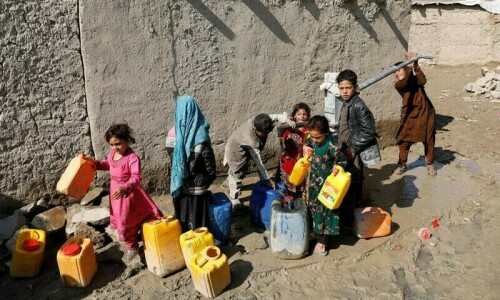GREENLAND’S ice sheet melted more in 2019 than any previous year on record. It was easy to miss this news, amidst more seemingly pressing reports of pandemics and populists, recessions and revolutions. What could be more distant than Greenland? Wasn’t your reaction to the first sentence of this column: who cares?
That’s how a growing global army of climate deniers wants you to respond. Even as empirical evidence of the accelerating pace of climate change stacks up, climate scepticism is growing. This manifests as concerted efforts to undermine the scientific consensus on man-made global warming and climate change. The clear links between the spread of the coronavirus (and other zoonotic diseases) and the impacts of climate change, particularly animal habitat fragmentation, have also failed to lay climate change denial to rest.
There are many drivers for climate change denial, the most powerful being the cynical efforts of vested interests. The world’s five largest publicly owned oil and gas companies spend approximately $200m a year to lobby against climate-friendly policies. They also fund groups — with the veneer of NGOs and CSOs — to proactively spread misinformation about climate change (including shocking fallacies such as the contention that increasing carbon dioxide levels are good for the planet and its inhabitants).
Such negation of fact is bolstered by siloed economic analysis, which has given traction to the idea that climate change is too expensive to mitigate (without, for example, similarly analysing the cost to national GDPs of fossil fuel subsidies).
Facebook’s wider policies work in favour of deniers.
Domestic and international political dynamics also facilitate climate change denial, both directly and indirectly. In places like the US, where views on climate change are polarised along political lines, one’s perspective is likely dictated by party affiliation rather than an understanding of scientific data. In other Western contexts, the prevalence of libertarians and conservatives who champion small government and minimal regulation leads to a rejection of pro-climate policies owing to their necessarily top-down, wide-ranging nature, rather than their substance.
Deep-seated religio-cultural reasons also play a part. For example, in the US, conservative Christians deny climate change on the basis that interference with the divine course is a form of faithlessness, or because of apocalyptic beliefs.
On the global stage, climate change denial is spurred by countries making false equivalences when faced with multilateral demands to reduce greenhouse gas emissions. The ‘we won’t do it if they don’t’ argument deployed by high-polluting Western countries is a form of climate change denial because it ignores the fact that developed economies are the greatest polluters (consider China’s share of emissions, at 28 per cent, versus Africa’s, at under 4pc).
The current global media landscape also enables climate change deniers. For instance, the social media platform Facebook has climate- and science-focused fact-checkers, which should be a good antidote to the spread of inaccurate information about climate change. However, the platform’s wider policies work in favour of deniers. Facebook does not fact-check opinion-based content, so as long as climate-related misinformation is packaged as a point of view, it can run rampant.
Climate scientists seeking to refute inaccuracies on social media are in a bind. Their posts and videos that draw on peer-reviewed, data-based findings published in academic journals are also presented as ‘opinions’, dragging them down to the same level as climate sceptics’ propaganda. In the US, Facebook’s policies have deemed climate change to be a political issue, and climate scientists seeking to share reliable information are either required to register as political organisations or share personal information that could leave them vulnerable to harassment. Some who have failed to do so have found their accounts blocked.
Climate change denial is not (yet) rampant or politicised in Pakistan; indeed, the country in July celebrated achieving the UN Climate Action Sustainable Development Goal (SDG-13) a decade earlier than the 2030 deadline. Our green policies are headed in the right direction. But climate change is a global phenomenon, and as the fifth-most vulnerable country in the world to climate change, we should do what we can to counteract deniers elsewhere. Ideally, this should be a prioritised foreign policy goal.
Pakistan also has its fair share of deniers and conspiracy theorists on myriad other topics, whether Covid-19 or polio, geopolitics or national security, free speech or minority rights. One key lesson we can learn from climate change denial is that it is not an organic or inherently legitimate phenomenon. Dig deep, and you can see why it persists, which is the first step to tackling it. The same approach can be applied to dismantling other misinformed positions.
The writer is a freelance journalist.
Twitter: @humayusuf
Published in Dawn, August 24th, 2020













































